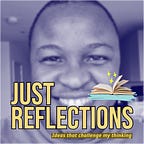I thought I understood love before I became a father.
I’d loved deeply; my wife, my friends, my siblings, my parents. I’d read about it, prayed about it, written about it. Love was something I knew well, or so I believed. But there are levels to understanding something as complex as love. And my understanding before had missing elements.
The love I have for my wife began the way most romantic love does: with choice. I noticed her; the way she laughed, the sharpness of her mind, how she moved through the world with this quiet confidence that I found magnetic. She had qualities I admired, values that aligned with mine, a way of seeing things that made me want to build a life alongside her. I chose her. And in choosing her, I was also choosing myself. Choosing the kind of life I wanted, the kind of person I wanted to become.
There’s nothing cynical about that. I think that’s how most of us love. We meet someone, and something in them calls to something in us. They fit. They make sense. They have to, in some way, earn our affection. Not through performance exactly, but by being the kind of person who draws love out of us. That’s natural. It’s healthy, even.
Over time, of course, that love deepens. It becomes less about the qualities that first attracted you and more about the person themselves, flaws and all. The conditions soften. The love becomes unconditional, or at least it moves in that direction. You forgive things you wouldn’t have tolerated at the beginning. You stay through hard seasons. You learn that real love isn’t just attraction; it’s commitment to someone even when they’re not at their best.
I thought that was the highest expression of love I’d ever experience. Two people who chose to reveal their most vulnerable parts to each other and do life with each other, no matter what.
Then, my daughter was born.
The first time I held her, this two-kilogram, wrinkled creature with eyes that couldn’t quite focus yet and limbs that wriggled aimlessly, I felt something crack open in my heart. It wasn’t gentle. It was overwhelming, almost violent in its intensity. Here was this tiny person who couldn’t do anything for me. She couldn’t charm me. She couldn’t impress me. She couldn’t even look at me and smile.
In those first weeks, she cried. My God, did she cry! The kind of crying where she’s absolutely inconsolable as if she’s in heart-wrenching pain, that makes you question everything about your competence as a parent. She kept us up through nights that felt endless, where I’d pace the passageway with her on my shoulder, her small body rigid with whatever discomfort she couldn’t articulate, and I’d feel this bone-deep exhaustion settling into me.
If you’re a parent, you know this peculiar chemistry, where exhaustion and frustration somehow transform into fiercer devotion. Where the very thing that’s breaking you is also remaking you. Where you discover reserves of patience you didn’t know existed, even as you’re running on empty.
If I’d applied the same criteria to her that I’d applied to my wife, if I’d evaluated her based on the qualities she brought to my life, I wouldn’t have loved her. She gave us nothing but need. She disrupted everything. She made our lives objectively harder. Especially my wife’s life; she took all the time and attention and energy and affection of the woman I love the most in the whole world.
And yet.
She drew love out of me with a fierceness that kept growing.
Not because of who she was, she wasn’t anyone yet, really. But simply because she was. Because she was mine. Because when I looked at her sleeping in my arms, her tiny fist curled around my finger, something in me recognised something in her. This wasn’t love I’d chosen. This wasn’t love I’d earned or that she’d earned from me. This was love that just... existed. Fully formed. Unconditional from the very first breath.
That’s when I realised: I’d been thinking about love all wrong. Or at least my picture was incomplete.
Suddenly, all the theology I’d preached for years about grace didn’t feel theoretical anymore.
I’d always known, intellectually, about unconditional love. I’m a Christian. I’ve preached about grace, about how God loves us not because of what we do but because of who He is. I could quote the verses, explain the theology. I understood the concept.
But understanding and experiencing are two different things.
Before my daughter, I had no framework for practicing that kind of love. Every love I’d experienced before had an element of reciprocity built into it. My friends chose to be my friends. My wife chose me. Even my relationship with God, as one-sided as His love is, involved my response, my faith, my actions.
But my daughter? She didn’t choose me. She couldn’t respond. She couldn’t reciprocate. And yet I would have, and still would, do anything for her. I’d sacrifice sleep, money, comfort, my own needs. I’d put myself between her and any harm without thinking twice. Not because she earned it, but because loving her is woven into the fabric of who I am now.
Parenting didn’t teach me a new concept. It thrust me into a new position. For the first time in my life, I was in God’s shoes, or the closest a human can get. I was the one loving first. The one loving despite. The one loving toward a vision of who this person could become, even though right now she’s just beginning to exist in the world.
But this revelation didn’t settle things. It unsettled them.
If this was what love really was, this unconditional, unearned, fierce devotion, then are all the other loves lesser or incomplete or practice runs?
Here’s what I think: parental love isn’t just unconditional. It’s transformational.
When I hold my daughter, I don’t just accept her as she is, though I do, completely. I also see who she could be. I have this vision of her: full of potential, full of possibility. I see the woman she might become: confident, kind, capable of deep thought and deep love. And every decision I make now, every way I interact with her, is aimed at helping her become that person.
If you’re a parent you’ve probably felt this, looking at your child and experiencing time collapse. Seeing simultaneously who they are and who they’re becoming. Feeling the sacred weight of being the bridge between those two realities. Feeling like you’re holding potential itself in your arms.
But it’s also terrifying. What if I get this wrong?
This transformational quality of love is about having hopes for your child, sure, but it’s also about being an active participant in their becoming. Every interaction is formative. When I soothe her cries, I’m teaching her the world is safe. When I delight in her babbling, I’m teaching her that her voice matters. When I maintain consistency even when I’m exhausted, I’m building her capacity to trust.
And it’s not just my individual interactions with her. She’s watching everything. The way my wife and I speak to each other. How we handle disagreement. Whether we show contempt or compassion when we’re frustrated. Whether we stonewall or stay engaged when things get hard. Every pattern she observes is writing code in her developing mind about what love looks like.
If we model anxious attachment, she’ll learn that love is uncertain. If we can’t handle conflict well, she’ll learn that disagreement means disconnection. If we show each other contempt, she’ll learn that love includes cruelty.
The weight of this hit me one night when my wife and I were having a tense conversation, and I saw my daughter watching us intently. She couldn’t understand our words, but it really seemed like she could feel the energy. And that made it real to me that we’re not just living our marriage. We’re teaching her what marriage is.
So in these ways, love is a creative force. Not creating from nothing, as God does, but partnering with Him in the sacred work of shaping a life. And the stakes couldn’t be higher.
With my wife, I can hope for who she might become, but my influence on that is limited. She’s an adult making her own choices. But my daughter’s completely impressionable. Frighteningly so. My wife and I are her world right now. Individual moments might not matter much. But the cumulative pattern of how we love her will shape who she becomes.
I think about it like erosion. Each individual abrasion is subtle, almost imperceptible. But over time, it shapes the landscape. Except we’re not just wearing away at something. We’re also building. Every loving interaction deposits something: security, worth, capability. It’s erosion and accretion happening simultaneously. We’re both carving channels and laying down sediment that will become the bedrock of who she becomes.
So transformational love operates on two levels simultaneously. First, it accepts completely: ‘You are enough, right now, exactly as you are.’ Then it calls forward: ‘And I see who you could be, and I’m here to help you get there.’
This isn’t conditional love masquerading as unconditional. The acceptance is real and complete. But real love doesn’t leave us where we are. It sees our potential and labours toward it. Unconditional doesn’t mean static. It means ‘I love you at every stage of your becoming.’
That’s what real love does. It accepts first. Then it transforms.
I couldn’t help but wonder: if love shapes us this profoundly, if every interaction is writing code in my daughter’s developing mind, then how was I shaped? What loves formed me? What code was written into my own understanding?
Looking back, I can see a pattern. Each form of love I’ve experienced hasn’t been random. They’ve been sequential, building on each other. Each one teaching me something I needed to know for the next.
When you’re a child, you receive love before you can do anything to deserve it. Your parents love you simply because you exist. You learn that you are inherently valuable, not because of what you accomplish or how you perform, but because you are theirs. That’s your first lesson: you are worthy simply by being.
That’s what I was giving my daughter now. She was receiving what I had received. The circle was completing itself.
Then you grow up alongside siblings. Sibling love is strange. You don’t choose your siblings. They’re just there. Sometimes they annoy you. Sometimes they’re nothing like you. But you love them anyway. You learn to coexist with people you didn’t select, to practice patience and loyalty even when resonance isn’t automatic. That’s the second lesson: love can endure even when it’s not chosen.
Then comes friendship, the first time you really get to choose. You meet someone and think, “Yes, this person. I want to walk through life alongside them.” There’s freedom in that. You’re choosing based on shared values, shared interests, shared routines. That’s the third lesson: love flourishes in choice.
But then romantic love enters, and the stakes change entirely. You’re choosing someone you’re going to let into the most private, most vulnerable parts of your life. You’re handing someone the power to truly hurt you, trusting they won’t use that power against you. It’s love with skin in the game. You’re saying, “Here’s my whole self: the good, the bad, the broken. And I’m trusting you with it.” That’s the fourth lesson: real love involves risk.
And then you become a parent. And suddenly, you’re on the other side of the equation entirely. You’re no longer just receiving love or choosing to give it. You’re creating it from nothing. You’re loving someone who didn’t earn it, who can’t reciprocate it, who doesn’t even understand it yet. You’re pouring yourself out into this small person who gives you nothing back except need.
And you do it gladly. Sacrificially. With a kind of devotion that surprises even you.
To love someone who hasn’t done anything to deserve it. To see who they could be and love them fiercely even though they’re nowhere near that yet.
And this wasn’t just my journey. This is THE journey. The universal pattern. Every human being, ideally, goes through this same curriculum. We all learn love in stages, each one preparing us for the next, each one revealing something new about the nature of love itself.
And if that’s true, if there’s this built-in progression from receiving to giving, from being loved to loving like God loves, then maybe the whole structure of human relationships is designed to teach us something.
I used to hear the phrase “God is love” and think of it as a theological definition. But now I think it’s more than that. I think it’s not just describing God but revealing the key to a map.
Our whole journey with human relationships is the map. Showing us all the different waypoints of love and how they’re all connected and how they interact. And ‘God is love’ is telling us that all that is about teaching us who God is.
It is all about teaching us to understand Him better. The different stages of life, the different forms of love we experience, they’re all part of that curriculum.
Childhood teaches us we are loved without needing to earn it. Siblings teach us to love those we didn’t choose. Friendship teaches us to choose love freely. Romance teaches us to love vulnerably. Parenting teaches us to love sacrificially, creatively, without expectation of return.
This whole progression is God revealing Himself to us, piece by piece, through the very structure of human relationship. Life itself is His way of teaching us to recognise Him.
Once I understood this, something about my own life suddenly made sense.
I’ve been exhausted for years. Not just physically tired, but soul-tired. I wake up with this constant anxiety that I need to perform, to achieve, to prove I’m enough. Even after accomplishments, even after success, the feeling never goes away. It just resets. The bar moves higher. The treadmill speeds up.
I’m a grown man, a husband, a father and I’m still trying to earn something from someone who isn’t even keeping score anymore.
I’ve spent so much energy trying to earn something, but I could never quite name what I was trying to earn. Love? Respect? The right to exist without apology?
And then it clicked: what if I’m exhausted because I never fully learned the first lesson? What if I’ve been trying to earn what was already mine?
I can trace it back. The subtle ways love got tied to achievement in my childhood. The praise for good grades that felt like love. The disappointment over failures that felt like withdrawal. Not malicious, not intentional, but still there. Still teaching me that I had to earn my place.
And now I’m terrified of doing the same thing to my daughter.
Because this exhaustion isn’t just personal. It’s generational. It’s systemic. Every parent who didn’t fully receive that first lesson, that they’re loved simply for existing, struggles to give it to their children. We love them for their achievements, their behavior, how they reflect on us. We pass on the performance. We pass on the exhaustion.
When you don’t know you’re loved just for being, you spend your whole life trying to earn what’s already yours. And then, without meaning to, you teach your children the same desperate dance.
This is why what I’m learning with my daughter matters so much. It’s not just about us. It’s about breaking a cycle. Every time I love her in her neediness, every time I delight in her simply because she exists, I’m writing different code. I’m teaching her the first lesson properly. I’m giving her what every human being needs: the knowledge that she is loved without needing to perform.
We’re not just learning about love. We’re deciding what kind of love gets passed forward.
Yesterday, my daughter cried uncontrollably when her mother was out. Probably feeling anxious about the separation. A few months ago, I would have felt only exhaustion and anxiety. But as I comforted her, I found myself thinking about this architecture of love I’d been discovering.
Here she was, giving me nothing but need in this moment. And here I was, loving her fiercely anyway. And maybe, just maybe, she was learning what has taken me my whole life to understand: that she is loved before she does anything to deserve it.
She doesn’t know it yet, but through these moments, she’s receiving her first lesson in the curriculum. The same one I received. The same one humans have been receiving since the beginning.
And one day, if we do this right, if my wife and I can model healthy love, if we can show her that conflict doesn’t mean disconnection, that vulnerability is strength, that love accepts and transforms, she’ll pass it on. Not the anxiety. Not the performance. But the truth that love isn’t just an emotion or a choice or a commitment. It’s all of those things, yes, but it’s also a kind of participation in something larger. A way of being that reflects the heart of God Himself.
Each form of love I’ve experienced, childhood, siblings, friendship, romance, parenting, has been like a window into a different room of the same vast house. Each one showing me a new angle, a new colour of the spectrum. And together, they’re giving me a fuller picture of what love actually is.
Life itself seems to be one long education in love. Each stage, each relationship, each chapter revealing a new piece of the same design.
And maybe that’s the point. Maybe God keeps finding new ways to show love to us. Through parents, through siblings, through friends, through spouses, through children. Until one day, we finally recognise it for what it’s always been.
Not just something we feel or something we do.
But Someone we’re learning to know.










